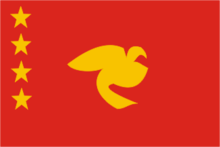- Myanmar National Democratic Alliance Army
-
The Myanmar National Democratic Alliance Army (MNDAA, Burmese: မြန်မာအမျိုးသား ဒီမိုကရက်တစ် မဟာမိတ်တပ်မတော်), formally the Kokang Democracy Party,[1] is a rebel army of Kokang people in northeastern Burma and has existed since 1989. The army, also known as the Eastern Shan State Army,[2] has had a ceasefire with the Burmese government for two decades.[3] Yang Mao-liang is the leader of the MNDAA.
Contents
Background
The area had been under the control of several warlords since the 1960s.[4] The army was formed on March 12, 1989, after the local Communist Party of Burma leader, Phone Kyar Shin (Peng Jia Sheng), who had been with the communists since 1968, broke away and formed the MNDAA.[4] Along with his brother, Peng Jiafu, they became the new unit in Kokang.[5] The strength of the army is between 1,500 and 2,000 men.[5]
The rebels soon became the first group to agree to a ceasefire with the government troops.[4] After the ceasefire, the area underwent an economic boom, with both the MDNAA and regional Myanmar Armed Forces (Tatmadaw) troops benefiting financially from increased opium harvests and heroin-refining.[6] The area also produces methamphetamine.[7] The MDNAA and other paramilitary groups control the cultivation areas, making it an easy target for drug trafficking and organised crime groups.[7]
Kokang incident
Main article: Kokang incidentIn August 2009, the Myanmar National Democratic Alliance Army became involved in a violent conflict with Burma's military junta, the Myanmar Armed Forces. This was the largest outbreak of fighting between ethnic armies and government troops since the signing of the cease-fire 20 years earlier.[8]
See also
References
- ^ Fredholm, Michael (1993). Burma: ethnicity and insurgency. Praeger. p. 205. ISBN 978-0275943707.
- ^ Dupont, Alan (2001). East Asia imperilled: transnational challenges to security. Cambridge University Press. p. 308.
- ^ Ethnic group in Myanmar said to break cease-fire. Associated Press. August 28, 2009.
- ^ a b c South, Ashley (2008). Ethnic politics in Burma: states of conflict. Taylor & Francis. p. 140. ISBN 978-0203895191.
- ^ a b Rotberg, Robert (1998). Burma: prospects for a democratic future. Brookings Institution Press. p. 169.
- ^ Skidmore, Monique; Wilson, Trevor (2007). Myanmar: the state, community and the environment. ANU E Press. p. 69.
- ^ a b Shanty, Frank; Mishra, Patit Paban (2007). Organized crime: from trafficking to terrorism. ABC-CLIO. p. 70.
- ^ Johnson, Tim (August 29, 2009). China Urges Burma to Bridle Ethnic Militia Uprising at Border. The Washington Post.
Categories:- Politics of Burma
- Paramilitary organizations
Wikimedia Foundation. 2010.

